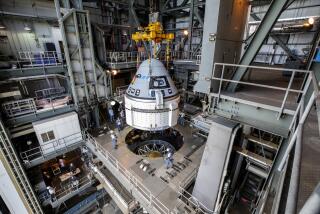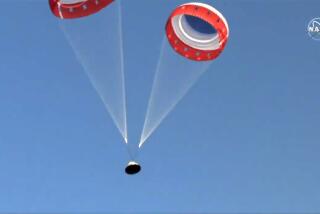Boeing’s Delay With Software Crimps Testing of ‘Star Wars’
- Share via
Boeing Co., the largest aerospace company, is late delivering software that will be used to help determine if the U.S. proceeds with a missile defense program, the Defense Department’s top testing official said Thursday.
The delay--more than four months--places “significant limitations” on the ability to evaluate the effectiveness of the missile system against different attacks, said Philip Coyle, the Pentagon’s director of operational tests and evaluation.
President Clinton is expected to decide this summer on whether to deploy the more than $12-billion system, a scaled-down version of the 1980s Strategic Defense Initiative, also known as “Star Wars.” The program was dealt a setback when a missile failed to intercept a mock warhead Jan. 18, the second of three tests scheduled before Clinton makes his decision on the National Missile Defense system.
Boeing is the main contractor for the system. The software is being developed at Boeing’s facilities in Anaheim and at Schriever Air Force Base in Colorado Springs, Colo.
Delivery of the software has been pushed back to March from November. The software will be used to analyze hundreds of simulated missile attacks. The information will be combined with the missile test results and presented to the president.
The “absence of a functioning and valid [simulation system] will place significant limitations on the Defense Department’s ability to assess the potential effectiveness,” Coyle said in a statement. He termed the delay “very serious,” with the last missile test scheduled for late April or early May.
“Boeing is devoting the necessary resources to meet the schedule,” said Cynthia Taylor, a spokeswoman for the company’s Space & Communications group in Anaheim.
Boeing, maker of commercial aircraft, Delta rockets and F-18 Navy fighters, has a three-year, $2.2-billion contract to manage the missile defense system. About 15% of the money, or $310 million, has been set aside for performance bonuses.
The federal government awarded Boeing the contract in April 1998. Rockwell International Corp. had been working on a project proposal at the time that its aerospace and defense businesses were acquired in late 1996 by Boeing.
Subcontractors on the project include TRW Inc. and Raytheon Co. TRW is developing the command and control system for launching interceptor missiles, while Lexington, Mass.-based Raytheon is building the warheads.
At least 17 actual intercept tests plus thousands of simulations are scheduled through 2005 if Clinton decides to deploy the system, said Steven Hildreth, a missile defense expert for the nonpartisan Congressional Research Service.
“Because these tests are so expensive--$100 million to $150 million a pop--they want to do as few as necessary and must rely more on simulation,” Hildreth said. “I was surprised they are that far behind.”
The national missile-defense system envisions a network of ground-based radar, low-orbiting satellites, communications equipment and as many as 200 interceptor missiles based in Alaska or Grand Forks, N.D.
“We recognize the importance of the simulation capability and we are making a concerted effort to focus and address the issue,” said Air Force Lt. Col. Richard Lehner, a spokesman for the U.S. Ballistic Missile Defense Organization.
Boeing shares fell $1.31 to $43.44 on the New York Stock Exchange, while Raytheon’s Class B shares fell 31 cents to $22.19. Cleveland-based TRW’s stock fell 31 cents to $42.25.
More to Read
Inside the business of entertainment
The Wide Shot brings you news, analysis and insights on everything from streaming wars to production — and what it all means for the future.
You may occasionally receive promotional content from the Los Angeles Times.










